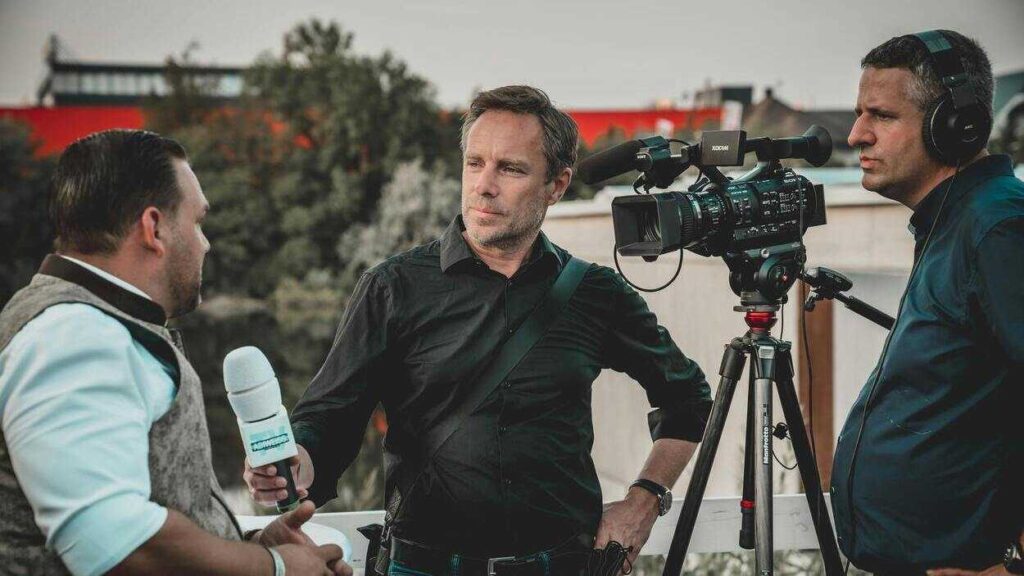Truth & Goodness
Poison on a Plate: What Drives Us to Eat Dangerously?
01 March 2026

More and more people are turning away from big media. Information giants are still present but are losing influence and no longer shaping public opinion. What is replacing them? Audiences are seeking knowledge, authenticity, and trust in niche websites, expert YouTube channels, and professional podcasts.
Readers, listeners, and viewers are increasingly turning away from major news outlets – this is a global trend, also visible in Poland.
Trust in the media about world events is only at 40%, according to the 2024 Reuters Institute Digital News Report. The latest edition of the 2025 report brought a breakthrough: for the first time in the study’s history, more people reported getting their information from social media, independent websites, and video channels than from traditional newsrooms and television.
For years, trust in mainstream media has been systematically declining. As early as 2023, a Gallup poll showed that only 34% of Americans had a great or moderate amount of trust in major media, and only 20% trusted television news. What’s worse, as many as 39% of those surveyed declared a complete lack of trust in them.
Why is this shift away from mainstream media happening?
The first reason is so-called media fatigue. This is the mental exhaustion of audiences flooded with shallow and sensational content. Wars, crises, political conflicts – the constant, negative news cycle causes anxiety and helplessness. Studies show that too much exposure to such news leads to news avoidance and a conscious selection of sources.
The second reason: disappointment and a sense of betrayal. In the race for clicks and reach – especially in ad-based models – many large newsrooms abandon reliability in favor of emotional ploys. Audiences increasingly feel they are being manipulated – instead of informing, the media tries to control their emotions.
The third reason: the strong politicization of the largest media outlets. Audiences perceive them not as a source of objective information but as parties in a political conflict.
The fourth reason: the erosion of journalistic standards. Reliability and impartiality are giving way to so-called identity journalism, which is too often accompanied by disinformation and a loss of credibility.
And finally, the fifth reason, a direct result of the previous ones: the popularity of alternative information sources is a response to the bias and low quality of mainstream media.
The effect? Instead of clicking on sensational headlines like “See what this politician did” or “Doda on the beach – the singer’s photos are shocking!”, more and more people in niche media are choosing content that truly interests them. Studies show that younger generations – especially Gen Z – are looking for media that reflect their values, interests, and language.

Today, alongside the big media that complain about a decline in readers and website views, dozens of niche thematic websites, popular science YouTube channels, and specialized history, technology, or economic podcasts are thriving. All of them gather a loyal and engaged audience. Their common denominator? Respect for the audience’s intelligence.
“Niche podcasts provide a unique level of intimacy and specificity that mainstream shows – regardless of their popularity – aren’t always able to match,” wrote the authors of a study published on Soundsprofitable.com in January of this year. In June, the InsideAudioMarketing website reported: “Podcasts are solidifying their position as a major medium for news consumption in the U.S.,” and “News podcasts are particularly popular among people under 35 – a demographic group that is increasingly difficult for traditional media to reach – and are disproportionately preferred by Americans with higher education.”
But let’s leave the U.S. and return to the Polish market. Speaking of the success of independent creators, it’s impossible not to mention the excellent results achieved by Krzysztof Stanowski’s YouTube channel, Kanał Zero, which, thanks to the creator’s personality, quickly overshadowed many mainstream media outlets in popularity. However, while a large editorial team and substantial advertising money are behind the success of Kanał Zero – which has already become a mass medium at the center of public debate – individual “YouTube” podcasters are also winning the trust of viewers.
A great example is Dariusz Rosiak’s Raport o stanie świata (Report on the State of the World). After being fired from the radio, Rosiak launched his own podcast and was successful. Its strength lies in in-depth, balanced commentary on world events—something often missing from the mainstream.
Podcasts like Szymon Pękala’s Wojna Idei (War of Ideas), Dział Zagraniczny (Foreign Affairs), or the new-to-the-YouTube market Radio Debata by Aleksandra Fedorska are attracting viewers. In addition, there is the huge popularity of Polish popular science channels on YouTube, such as Nauka. To lubię (Science. I like it), Uwaga! Naukowy Bełkot (Attention! Scientific Gibberish), SciFun, and Historia bez Cenzury (History without Censorship).
This clearly shows one thing – there is a growing demand for complex topics explained in a clear, engaging way. Mainstream media often ignore this need, focusing exclusively on politics and current events.
“It’s easier to find valuable sources that publish high-quality content online. This is an effect of scale. More creators are working online, and more content is being created. Thanks to this, the audience can find something that truly interests them more quickly,” Szymon Pękala, the creator of Wojna Idei, recently said in an interview with Holistic News.
To back this up, let’s cite some data. In Poland, as reported by the Nowy Marketing website in June, nearly one-third of Poles listen to podcasts at least once a week. And over 41% listen at least once a month.
But it’s not just YouTube and podcasts that are taking over the audience and readers of former media giants. New, until recently niche, online portals are also pushing their way onto the market.
Why are previously niche media outlets slowly but surely taking the place of large media corporations? The key lies in authenticity and specialization.
Audiences want to hear voices that sound credible. They no longer tolerate cheap clickbait like “The best tips for New Year’s Eve” or view traps where you have to click through fifteen slides to find out what’s happening on the eastern border or what the result of the Lech vs. Legia match was.
In Poland, a good example is Spider’s Web – a website that quickly transformed from a niche tech blog into an influential industry medium. Bezprawnik – a portal focused on legal, financial, and social topics – and Notes from Poland – a news portal dedicated to English-speaking audiences – have gone through a similar process of gaining readers.
The development of the Holistic News portal is also an example of this trend. In a short time – since the spring of 2023 – it has gained several hundred thousand unique users who visit our portal monthly, and their number is growing steadily. In July, the portal recorded nearly 700,000 views. The editorial team resumed the publication of a high-quality print quarterly and launched the Holistic News channel on YouTube. And Holistic News readers write directly in their emails: they turn to this portal because it provides information that helps them understand the changes taking place in the modern world.
All of this clearly shows that there is a huge group of consumers who are not only abandoning old media but are actively seeking alternatives and a cure for their toxic effects.
Tired of sensationalism, disinformation, and media clichés, people are increasingly seeking authenticity, specialization, and a sense of community. The relationship between the media and its audience has undergone a profound transformation. The media consumer is no longer a passive consumer. They are an active judge and reviewer who votes with their time, clicks, and often their wallet – by supporting the media that truly interests them (we sincerely thank you for all the “coffees” you’ve bought us – ed.).
The future of the media will no longer belong to a few giants. Instead, many smaller, independent sources are emerging – run by people whom audiences trust. Engaged communities are forming around them, seeking not only information but also meaning in an increasingly unpredictable world.
Read the original article: Wielkie media nie budzą już zaufania. To oni teraz kształtują opinię

Truth & Goodness
01 March 2026


Zmień tryb na ciemny